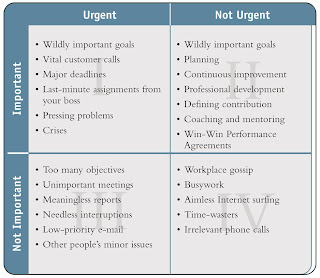Over the last couple of months, we’ve looked at daily and weekly planning, the key steps towards achieving increased productivity and balance. This week, we’ll finish the series by outlining the process of weekly planning.
The key benefit of weekly planning is that it gives you the chance to stop and think – to step back from the day-to-day and take a broader view. This can feel difficult when all of those urgent issues and tasks are pressing in on you but the busier you are, the more important weekly planning is. It only takes fifteen minutes or so and you can make it a regular part of your routine – essentially, a habit – by scheduling it into your diary as a weekly meeting with yourself.
The first step is to review your roles. Some of your roles will change as you go through life while other roles will stay with you for longer periods or even last a lifetime. Take a moment to reconnect with those roles, ensure they’re still relevant, and remind yourself of what you’re trying to achieve in these roles.
Secondly, ask yourself, what is the most important thing I could do in this role this week? Not everything you could do; not everything you have to do; not everything you hope to do. Just the most important thing – the one thing that would make all the difference. Of course, you'll do other things in those roles but what you’re looking for at this point is simply the most important thing.
The third step is then to schedule it into your week: if it’s an appointment, put it into your calendar, if it’s a task, put it onto your daily task list for the relevant day. When that day comes, that task is the most important thing you have to do that day – it’s your top priority. This is so important: it means that, whatever else happens that week, no matter what other urgent or unexpected activities come crashing into your schedule, you’ll have done some significant, longer-term, activity – something that takes you one step closer to achieving your goals.
You will have noticed that none of the steps to weekly or daily planning are what you might call rocket science and that’s a good thing. Complexity, in this case, is unnecessary – simple things, done well and repeatedly, will produce much more significant results in the longer term. But don’t take my word for it – try it for yourself and prove it.




